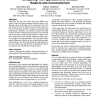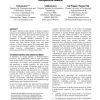131
click to vote
CRITICAL
2005
15 years 4 months ago
2005
This paper considers multiple meanings of dependability as part of a project investigating home based assistive and smart home technology for older people. It argues that because ...
CRITICAL
2005
15 years 4 months ago
2005
With its 10th biannual anniversary conference, Participatory Design (PD) is leaving its teens and must now be considered ready to join the adult world. In this article we encourag...
114
click to vote
CRITICAL
2005
15 years 4 months ago
2005
As computing moves into every aspect of our daily lives, the process, values and assumptions that underlie our technical practices may unwittingly be propagated throughout our cul...
145
click to vote
CRITICAL
2005
15 years 4 months ago
2005
During the last few years, there have been debates over what is context and how computers should act upon it. Two disparate camps of thought can be recognized. First, Realism, hav...
127
click to vote
CRITICAL
2005
15 years 4 months ago
2005
In traditional computer games, it is not uncommon for the game world to be inhabited by numerous computergenerated characters, Non-Player Characters (NPCs). In pervasive games, pl...
135
Voted
CRITICAL
2005
15 years 4 months ago
2005
This paper addresses design agendas in Human-Computer Interaction and neighbouring fields motivated by the mixing of areas that were mostly kept separate until recently, such as m...
110
click to vote
CRITICAL
2005
15 years 4 months ago
2005
Baran and Sweezy’s 1966 study of U.S. capitalism [2] argued that its fundamental problem is not “diminishing returns” but “the tendency of surplus to rise” – from whic...
127
click to vote
CRITICAL
2005
15 years 4 months ago
2005
This paper describes an ongoing design experience conducted in the Neonatal Intensive Care Unit for Premature Newborns. The specificity and the delicateness of such a setting prov...
CRITICAL
2005
15 years 4 months ago
2005
104
click to vote
CRITICAL
2005
15 years 4 months ago
2005
Critical computing should include a concern for the everyday work practice of IT professionals. We explain our ‘micro-ethical view’, which shifts focus towards everyday work c...


